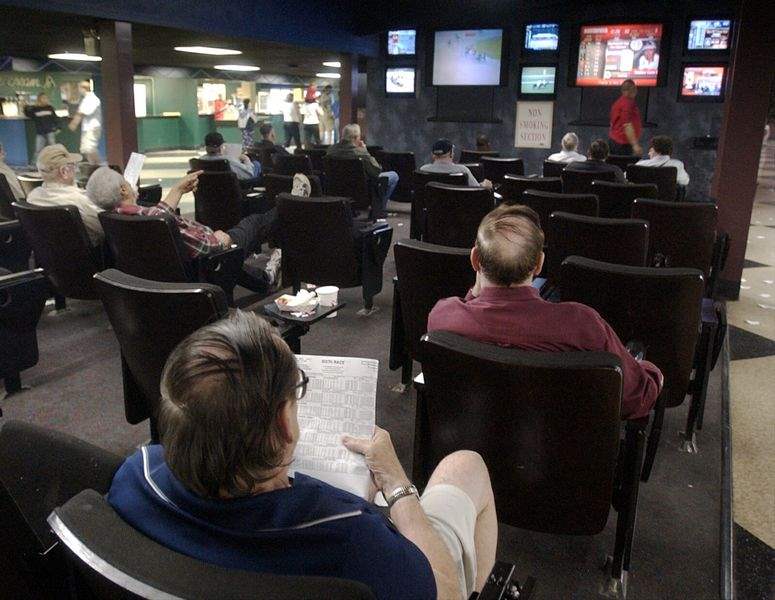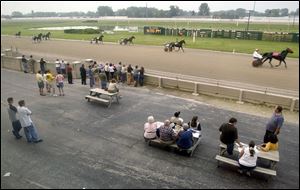
Ohio horse racing faces lean times without aid
6/15/2003
Horse racing enthusiasts enjoy the confines at Toledo Raceway Park, where they can keep tabs on their favorites with the aid of racetrack television monitors.

Raceway Park's summer daily paid attendance has declined to about 1,000, managers say.
COLUMBUS - Ohio's horse-racing industry is in danger, says the head of the state agency that regulates the industry.
“If the spiral continues, there will be some tracks that will close,” said Clifford Nelson II, executive director of the Ohio State Racing Commission. “The tracks have been having to cut expenses like never before.''
The amount wagered at the seven horse-racing tracks in Ohio has declined from $628 million in 1998 to $565.9 million last year. Ohio has three thoroughbred tracks and four harness tracks, including Toledo's Raceway Park.
“It is a dramatic loss in wagering,” said Mr. Nelson, who has worked at the racing commission since 1973.
Part of the decline is due to the downturn in the economy, but the biggest factors are the expansion of gambling nationwide and a sport that has seen its popularity erode, officials say.
As the amount wagered declines, purses - the prize money for the horse owners - also go down, said Scott Borgemenke, a member of the racing commission and a former lobbyist for Toledo's Raceway Park.
“This is an industry in Ohio that has become less and less competitive with surrounding states,” said Mr. Borgemenke, whose father, Ralph, was among the nation's top jockeys in the 1950s.
“What happens when the purses go down is the horses go other places to run, the field size shrinks, and when you send your product out for simulcast, there is less interest,” he said. Simulcasting is the televising of a race, enabling people to bet on races all over the country.
Owners of the seven horse-racing tracks say the way to increase purses is to allow video gambling machines at their tracks. State legislators are debating proposals to put the issue on the Nov. 4 ballot as a constitutional amendment.
Of the estimated $1.3 billion a year that the 17,500 video gambling machines would generate annually, the horse-racing industry would receive about $637 million.
Before Gov. Bob Taft appointed him to the state racing commission, Mr. Borgemenke helped organize the Ohio Horse Racing Council, a coalition of the seven horse-racing tracks in favor of adding video gambling machines to the mix. The racing commission has not taken a stance on the proposal, which Governor Taft opposes.
The track owners cite the larger purses at tracks with electronic slot machines, in particular Mountaineer Race Track and Gaming Resort in Chester, W.Va. About 70 percent of the visitors to the “racino” are from Ohio, say Mountaineer officials.
But anti-gambling activists say the imminent demise of the horse-racing industry in Ohio is a bad bet.
“Horse-racing is a fine sport, but there isn't anything in the Ohio Constitution that says the people have to bail out that industry,” said David Zanotti, president of the Ohio Roundtable, a Strongsville-based group which helped defeat a 1996 ballot issue that would have allowed casino gambling.

Horse racing enthusiasts enjoy the confines at Toledo Raceway Park, where they can keep tabs on their favorites with the aid of racetrack television monitors.
In fact, MTR Gaming Group, which owns Mountaineer Race Track and Gaming Resort, is purchasing Scioto Downs, a harness racetrack in Columbus, for $19.1 million.
Gambling foes point out that the horse-racing tracks in the 1990s said they needed off-track betting and full-card simulcasting to survive - and now they're “crying wolf again.”
Mr. Borgemenke said full-card simulcasting - which the legislature approved in 1996 - has become the major source of the tracks' revenue.
“Quite frankly, it's the only reason they're alive,” he said.
Former state Sen. Michael Shoemaker, a southeast Ohio Democrat, said if the goal is to save the horse-racing industry, the state could try to subsidize the purses without adding electronic slot machines.
“These slot machines will be popular for a year and a half and it will be just like the Ohio Lottery and Mega Millions. The excitement wanes. The American public is into so much sensationalism that watching horses run around a track doesn't do it for them,” Mr. Shoemaker said.
Michael White, the general manager of Raceway Park, said racetracks have lost their gambling monopoly over the last several decades.
“We are faced with competition from riverboats and casinos on our borders and unlike other businesses, we are not able to respond to that competition,” he said.
And that competition is not just from the casinos in Detroit and Windsor, Ont., or potentially the Michigan horse-racing tracks that could get approval to install video gambling machines.
The purse for live racing at Raceway Park is about $20,000 a night. At Dover Downs in Dover, Del., the average purse is $180,000; visitors can play 2,000 electronic slot machines.
Mr. White said video gambling machines are “essential to us continuing as a viable company.”
Ohio's racing commission has not collected attendance figures since 1995, in large part because some tracks, as a way of attracting people, do not charge admission, Mr. Nelson said.
Daily paid attendance during the summer at Raceway Park is about 1,000, a decline over the last several years, Mr. White said.
Although track owners say they hope the upcoming movie based on the best-selling book Seabiscuit: An American Legend, will entice newcomers to horse-racing, they're not expecting a big infusion.
“We can't offer millions and millions in prizes like the lottery,” said Mr. White. “We don't have the ease of the slot machine. Horse-racing appeals to people who enjoy the work of figuring out a puzzle, and you can double and triple your money in a race if you're willing to put the work in,” he said.